Posted by James (admin) on 6th May 2015
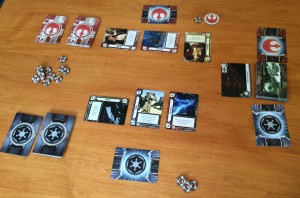 Star Wars: Empire vs Rebellion is a 2-player card game which uses the core game mechanics of Cold War: CIA v KGB with some changes and a Star Wars theme. (As Cold War: CIA v KGB is one of my favourite 2-player games, there are lots of comparisons to be made, but I shall save these until the end of the review so those who have
Star Wars: Empire vs Rebellion is a 2-player card game which uses the core game mechanics of Cold War: CIA v KGB with some changes and a Star Wars theme. (As Cold War: CIA v KGB is one of my favourite 2-player games, there are lots of comparisons to be made, but I shall save these until the end of the review so those who have
not played Cold War can understand this game on its own merits.)
At the start of each round, an objective card is drawn which sets several things: the total resource value, the capacity, and its objective value (plus, some have special rules for the round too). Each round, players take turns drawing or manipulating resource cards from their own resource deck (Empire or Rebellion). Each resource card has a number on it (usually 2 to 5) as well as a special power, and players can never have more resource cards than the objective’s capacity. The round ends only when both players pass in succession, and which player won the round is assessed. Usually, the player with the cards whose total value is closest to the the objective’s total resource value (without going over) is the winner of the round – there are some occasions when this is different but I’ll explain that later. The winner takes the objective card (as well as any resource tokens it grants) and the first player to have objective cards whose total objective value is 7 or more wins the game. Read the rest of this entry »
Tags: board game news, Board Games, board gaming, FFG, Star Wars: Empire vs Rebellion
Posted in Board Game Review, Board Games, Star Wars: Empire vs Rebellion | No Comments »
Posted by James (admin) on 5th May 2015
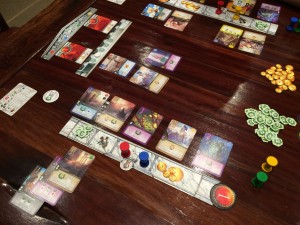 Elysium is Greek god themed game played over 5 rounds and the player with the most victory points (VPs) is the winner. Each round, players take turns taking either one of the god cards available that round or a turn order marker until they have had 4 turns. Each of the god cards gives its owner a benefit or ability – some abilities can be used once during the whole game, some are permanent abilities, some get used once per round, etc. When the cards are gained, they are placed in your ‘Domain’ – the area above your player board – these can be used for their abilities, but do not count towards scoring. During the game, you can move cards from your Domain to your ‘Elysium’ – the area below your player board – only in your Elysium do cards count towards scoring at the end of the game, but they can no longer be used for their abilities.
Elysium is Greek god themed game played over 5 rounds and the player with the most victory points (VPs) is the winner. Each round, players take turns taking either one of the god cards available that round or a turn order marker until they have had 4 turns. Each of the god cards gives its owner a benefit or ability – some abilities can be used once during the whole game, some are permanent abilities, some get used once per round, etc. When the cards are gained, they are placed in your ‘Domain’ – the area above your player board – these can be used for their abilities, but do not count towards scoring. During the game, you can move cards from your Domain to your ‘Elysium’ – the area below your player board – only in your Elysium do cards count towards scoring at the end of the game, but they can no longer be used for their abilities.
There are 8 sets of god cards in the game – each is a different colour and represents a specific god. Whilst the cards within each set have lots of variety, the abilities of each set of god cards have a common theme; for example, one god’s cards are about affecting other players, etc. Each game is played with 5 of the 8 sets, so this will give variety in replay, especially as 2 of the sets add extra rules too. Also, as well as the set (god/colour) it belongs to, each god card has the number 1, 2, or 3 on it too. The majority of VPs usually come from sets of god cards in your Elysium – either sets of the same colour but different number, or same number but different colour. Read the rest of this entry »
Tags: board game news, Board Games, board gaming, Elysium, Space Cowboys
Posted in Board Game Review, Board Games, Elysium | 2 Comments »
Posted by James (admin) on 25th March 2015
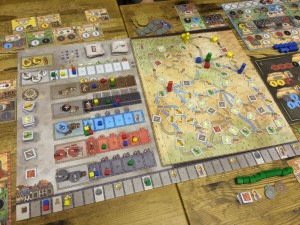
The main board with the different character tracks on the left, the roads/rivers/cities where players move and build trading posts on the right, and development track across the bottom.
Orléans is from dlp games who released the highly-entertaining game Citrus last year. Orléans combines multiple game mechanics such as bag-building, meeple movement, and worker placement.
Each player has a bag of character tokens (farmers, knights, craftsmen, etc.) and players will add more tokens to their bag during the game. At the start of each round, players draw some characters from their bag, and each player places them on their player boards in specific combinations to activate actions. Most actions require 2 or 3 characters to activate them so there are often tricky choices deciding in which combinations to allocate the drawn characters each turn. Players can part-fill actions and complete them on a later turn too.
There are lots of different actions to choose from. Many add a character to your bag and then advance you along the matching track on the central game board which give a benefit – the further along a track you are, the better the benefit. For example, adding a boatman to your bag advances you along the boatman track which earns you coins. Adding a knight to your bag also advances you along the knight track which allows you to draw more characters at the start of each round. Adding a trader to your bag allows you to take one of the building tiles and you can use the special action on it from then onwards – some special actions are cheaper versions of the main actions, but most are special abilities such as creating goods, or using a boatman character as a craftsman/farmer/trader instead. Read the rest of this entry »
Tags: board game news, Board Games, board gaming, dlp games, Essen, Orléans, Spiel 14, Spiel 2014
Posted in Board Game Review, Board Games, Essen Spiel 14, Orléans, Spiel 2014 | No Comments »
Posted by James (admin) on 24th March 2015
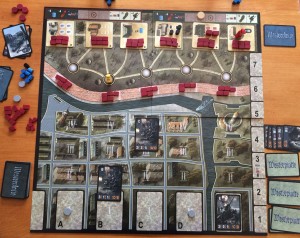
The players move around and defend the North of the board from the Germans who advance from the South.
7 Days of Westerplatte is a co-operative game about the opening shots of World War II, when a German ship began bombarding the Polish, with German troops soon following. During the game, players take on the role of the Polish in trying to last out 7 days. The game is relatively simple. Players take turns carrying out their turn and, once a player has completed their actions, the German forces take their actions.
On their turn, a player can move their troop figure up to 2 spaces and take 1 action, in any order. As an action, a player on one of the 6 building tiles can use the building’s power to do things such as gaining ammo, planting a land mine for the enemy to trip, fire a mortar (doing 2 damage to an enemy anywhere on the board), move some enemy units backwards, raise morale, or add 2 bricks to one area. (The mortars, mines and bricks are limited in number.) Alternatively, a player on one of the 5 spaces near the river can use their action to spend 1 ammunition to inflict 1 damage on an enemy troop, if there is one in the same column as the player. If other players are on the space, they can combine fire and also each spend 1 ammunition each to inflict 1 damage each too – this is very handy as tougher enemies appear. Read the rest of this entry »
Tags: 7 Days of Westerplatte, board game news, Board Games, board gaming, G3
Posted in 7 Days of Westerplatte, Board Game Review, Board Games | No Comments »
Posted by James (admin) on 30th January 2015
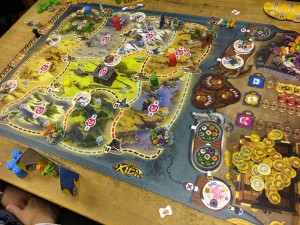 Lords of Xidit is a medium-weight eurogame whose core mechanic is about programming your moves and actions which results in a mix of short-term decision-making with some longer-term strategies. This allows you to recover if you mess up, or if someone gets in your way (intentionally or by outsmarting you).
Lords of Xidit is a medium-weight eurogame whose core mechanic is about programming your moves and actions which results in a mix of short-term decision-making with some longer-term strategies. This allows you to recover if you mess up, or if someone gets in your way (intentionally or by outsmarting you).
The Game
Players move their character around the land from city to city, recruiting units and defeating threats. At the start of each round, each player programs 6 actions that their character will perform in sequence. There are 5 actions to choose from: move along either the red, white, or blue road from their current city, interact with the city where they are located, or wait. You need to work out which actions you want to perform and where but, as with other action-programming games, you need to work out what your opponents will be trying to do too.
Interacting at a city with a recruitment disc lets you takes the least valuable unit from the disc (the more valuable ones are more rare). Interacting at a city with a threat disc lets you defeat the treat if you discard the required unit types shown in the disc. Successfully defeating a threat lets you pick one of the 3 reward types: gold, bard tokens, or tower sections. Bard tokens are placed in the city’s neighbouring areas which adds an element of area control to the game. Tower sections get placed in a stack at the city but no other player can have a tower in a city if an opponent has one there already. Read the rest of this entry »
Tags: Asmodee, board game news, Board Games, board gaming, Essen, Libellud, Lords of Xidit, Spiel 14, Spiel 2014
Posted in Board Game Review, Board Games, Essen Spiel 14, Lords of Xidit, Spiel 2014 | 1 Comment »
Posted by James (admin) on 16th October 2014
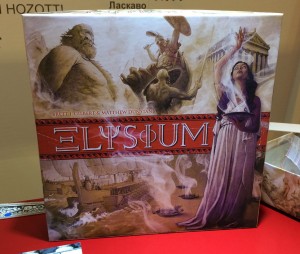 Elysium is the next game from Space Cowboys – the relatively new publisher who released the excellent (and SdJ nominated) Splendor. Whilst at Spiel, I was fortunate to be given a behind-closed-doors preview of the game.
Elysium is the next game from Space Cowboys – the relatively new publisher who released the excellent (and SdJ nominated) Splendor. Whilst at Spiel, I was fortunate to be given a behind-closed-doors preview of the game.
Note: The photos below do not show the final version of the game but it is quite close. Also, the rules I describe are from memory of what I was told so there may be some inaccuracies, and I am having them checked to make sure. Finally, please excuse the poor lighting in the photos – this was not obvious until I reviewed them.
During Elysium players are all demi-gods, competing to be the best and earn their way into legend. The game is played over 5 rounds and the player with the most victory points (VPs) is the winner.
On the table are several god cards (number of players x 3) as well as turn order markers for the next turn too (one per player). Each round, players take turns taking one of the god cards or turn order markers until they have had 4 turns and all items have been taken.
Each of the god cards gives its owner a benefit or ability – some abilities can be used once during the whole game, some are permanent abilities, some get used once per round, etc. When the cards are gained, they are placed above your player board and these can be used for their abilities, but do not count towards scoring. (To count towards scoring at the end of the game, the cards need to be moved to below your player board and can no longer be used for their abilities – more on that later.)
Read the rest of this entry »
Tags: board game news, Board Games, board gaming, Elysium, Space Cowboys
Posted in Board Games, Preview | 4 Comments »
Posted by James (admin) on 15th October 2014
 It’s now just one day to Spiel in Essen and time has run out to write more previews of the games that have caught my interest. In addition to those I have previewed, I have over 50 other games on my list too and there are bound to be more to discover during Spiel. It seems this year is very strong for Eurogames which suits me very well. Below is a list of some of the other games I shall be checking out.
It’s now just one day to Spiel in Essen and time has run out to write more previews of the games that have caught my interest. In addition to those I have previewed, I have over 50 other games on my list too and there are bound to be more to discover during Spiel. It seems this year is very strong for Eurogames which suits me very well. Below is a list of some of the other games I shall be checking out.
Mangrovia [Zoch]
Very clever sounding eurogame. Each round, players place their markers on one of the 5 islands which are arranged in a line – each island has two jetties (one on either side) which give different actions. Then, a boat travels around the islands and a player can carry out the actions at the jetties on their island when the boat passes them. The actions allow players to gain various resources (amulets, valuables, landscape cards) which they can use to build huts on the island (which is a grid and each space shows what the building costs and rewards are). Building huts can score VPs but there are bonus VPs for things like having the most huts in a column, having huts in a specific area of the island, etc.
War Stories: Red Storm [Conquistador]
Relatively simple war-game with a few twists on game mechanics.
Gothic Invasion [Storyception]
Asymmetric Romans versus Goths game of playing cards to manoeuver armies and wage war. The health of each army is represented by how many thousand troops it contains, which is nicely thematic.
Progress [NSKN]
Card-based civilisation game which could be good. Read the rest of this entry »
Tags: board game news, Board Games, board gaming, Essen, Spiel 14, Spiel 2014
Posted in Board Games, Essen Spiel 14, Preview, Spiel 2014 | No Comments »
Posted by James (admin) on 15th October 2014
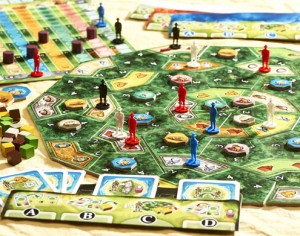 In addition to Aquasphere, Stefan Feld is releasing La Isla which looks to be a light eurogame with an interesting card game mechanic.
In addition to Aquasphere, Stefan Feld is releasing La Isla which looks to be a light eurogame with an interesting card game mechanic.
Players get 3 cards each round, and they secretly allocate one card to each of the 1st, 2nd and 4th action phases before they start resolving them. Each card shows 3 different elements which relate to each of the different phases during the round.
The card in the 1st phase is used for the special ability shown on it – these abilities can be used for the rest of the game, although there’s only room for 3 so these cards start to cover-up existing ones. The card in the 2nd phase is used to gain the specific resource shown on the card.
The 3rd phase is where the players perform the main action of the round (which doesn’t use a card). Players spend resources to place/move one of your explorer figures to a region in the jungle (and taking an animal tile and scoring victory points (VPs) if a region is completed surrounded by explorers. Read the rest of this entry »
Tags: Alea, board game news, Board Games, board gaming, Essen, La Isla, Spiel 14, Spiel 2014, Stefan Feld
Posted in Board Games, Essen Spiel 14, La Isla, Preview, Spiel 2014 | No Comments »
Posted by James (admin) on 14th October 2014
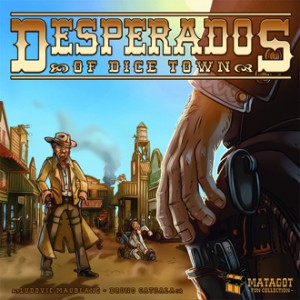 The original Dice Town is a great little dice-rolling game of second-guessing your opponents. Desperados of Dice Town is set in the same setting but is a completely different game. Players each have 5 desperados (each a different type) who begin locked up in jail. During the game, players will free their desperados and start gaining money (and make other players lose money).
The original Dice Town is a great little dice-rolling game of second-guessing your opponents. Desperados of Dice Town is set in the same setting but is a completely different game. Players each have 5 desperados (each a different type) who begin locked up in jail. During the game, players will free their desperados and start gaining money (and make other players lose money).
On their turn, a player rolls the 4 dice (with up to 2 re-rolls of any of the dice). Each dice has an ‘Action’ icon on 1 side and a character icon for each of the 5 different desperado character types (bad, ugly, brains, lady and boss) on the other 5 sides. Once they’ve finished rolling the dice, a player then chooses which action to take.
For each action icon rolled, the player can have any character who’s icon was also rolled take an action. For example, a player rolls 2 action icons, 1 bad character icon and 1 lady character icon – the player could either have the bad character act twice, the lady character act twice, or have both the bad and the lady characters act once each. If a character is in jail, an action moves them one step closer to escaping. If a character is free, an action makes all players lose money if their character of the same type are still in jail. Alternatively, instead of actions, a player can use 3 or 4 matching icons to draw cards which have special powers. Players also get a card if they roll rubbish too (4 different character icons and no action icon).
A player wins as soon as they have freed all of their desperados and has the most money. Read the rest of this entry »
Tags: board game news, Board Games, board gaming, Bruno Cathala, Desperados of Dice Town, Essen, Ludovic Maublanc, Matagot, Spiel 14, Spiel 2014
Posted in Board Games, Desperados of Dice Town, Essen Spiel 14, Preview, Spiel 2014 | No Comments »
Posted by James (admin) on 14th October 2014
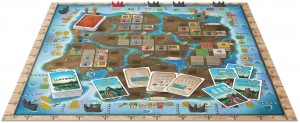 Murano is a game by Markus and Inka Brand, designers of the excellent Village. Players are competing to be the best businessman on the glass-blowing island and have the most victory points (VPs) when the game ends.
Murano is a game by Markus and Inka Brand, designers of the excellent Village. Players are competing to be the best businessman on the glass-blowing island and have the most victory points (VPs) when the game ends.
The core game mechanic is moving the various ships around the action spaces that are located around the edge of the board. On their turn, a player can move any ship any distance so long as it doesn’t overtake (or even share a space with) any another ship. A player can move one ship for free, and they can move more ships each one moved costs an increasing amount of cash. When done moving ships, the player takes the action of the space where the last moved ship moved to.
There are lots of different actions such as buying or placing streets, shops, palaces and other buildings on the various islands; producing glass (which costs you VPs due to the pollution), placing their coloured gondolas next to islands, and hiring characters. The special buildings give players on-going abilities for the game. There are various ways to score points and the key method is from characters (cards) you have hired during the game. Characters score VPs for lots of different factors such as the number of shops on an island, the number of customers on an island, if the numbers of different types of buildings match on an island, etc. Read the rest of this entry »
Tags: board game news, Board Games, board gaming, bran, Essen, Lookout Games, Mayfair Games, Murano, Spiel 14, Spiel 2014
Posted in Board Games, Essen Spiel 14, Murano, Preview, Spiel 2014 | 2 Comments »
 Star Wars: Empire vs Rebellion is a 2-player card game which uses the core game mechanics of Cold War: CIA v KGB with some changes and a Star Wars theme. (As Cold War: CIA v KGB is one of my favourite 2-player games, there are lots of comparisons to be made, but I shall save these until the end of the review so those who have
Star Wars: Empire vs Rebellion is a 2-player card game which uses the core game mechanics of Cold War: CIA v KGB with some changes and a Star Wars theme. (As Cold War: CIA v KGB is one of my favourite 2-player games, there are lots of comparisons to be made, but I shall save these until the end of the review so those who have









 Murano is a game by Markus and Inka Brand, designers of the excellent
Murano is a game by Markus and Inka Brand, designers of the excellent